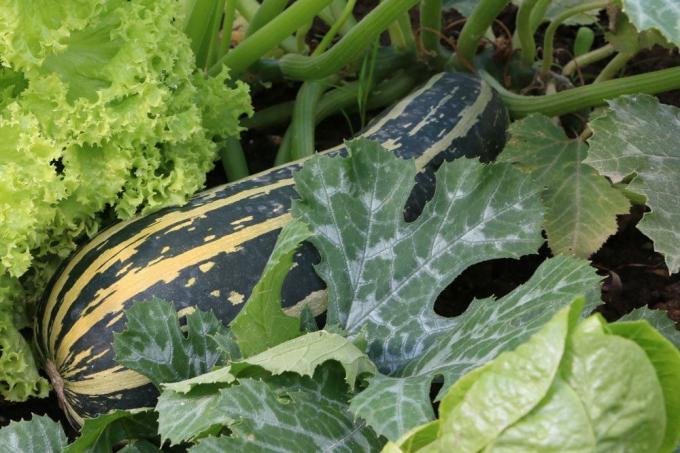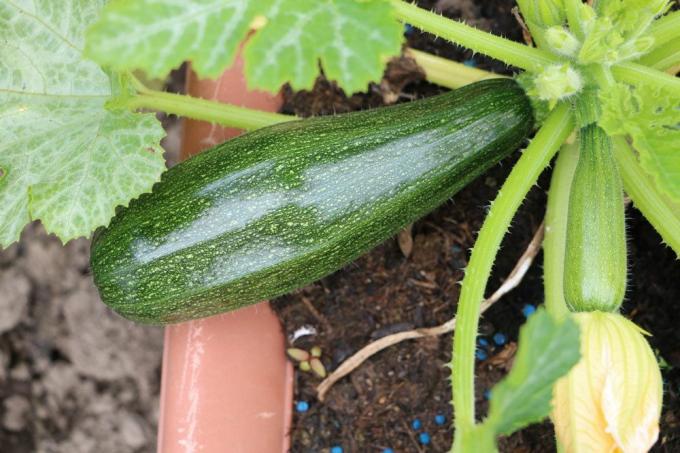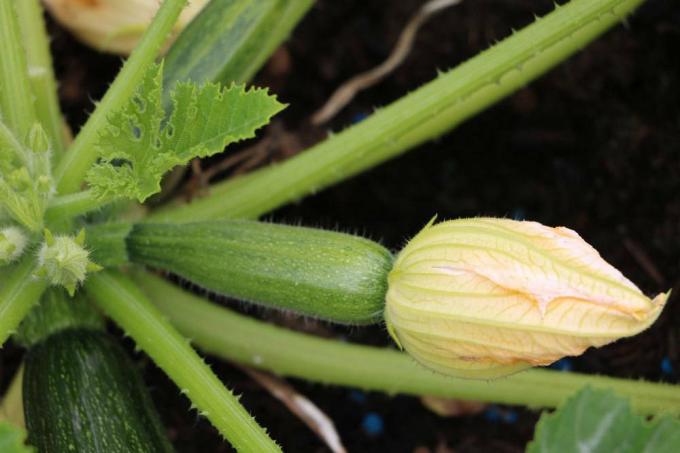
table of contents
- Raw consumption
- Toxin
- Bitter taste
- consumption
- Toxicity
- For animals
- measures
The zucchini comes from the pumpkin family and is very popular as a food. Visually, they resemble the cucumber, but there are huge differences in taste. In principle, zucchinis are not poisonous plants, they can also be eaten raw. However, this only applies under certain conditions.
Raw consumption
Can zucchini always be eaten raw?
Eating the vegetables raw is not only non-toxic, but healthy. Zucchinis are very popular in salads, as raw vegetables or as a decorative side dish on the plate. It only becomes dangerous when there are bitter substances in the vegetables. These have toxic effects on people and, in the worst case, can lead to death. The bitter taste of zucchinis is triggered by the bitter substance cucurbitacine, which greatly changes the taste of the vegetables.
Toxin
Why is cucurbitacine poisonous?
Cucurbitacins are protective substances that are developed by the cucurbits to protect themselves from predators. Zucchinis which are grown in the garden are usually harmless because the protective substances have been bred away. However, due to strong heat radiation or drought stress, as well as late harvest, it is possible that bitter substances are formed. These are then stored in the plant cells and are retained.

Already knew?
Ornamental squash also contains a large amount of bitter substances, which is why the pretty fruits must not be consumed.
Bitter taste
What are the effects of eating bitter zucchinis?
As a rule, the healthy sense of taste should automatically respond to the strongly bitter taste of a poisonous zucchini. However, depending on how they are prepared, spices and sauces can mask this taste and this can lead to the involuntary consumption of larger quantities. A small amount leads to classic gastrointestinal symptoms that are reminiscent of food poisoning.
These include:
- diarrhea
- Nausea
- nausea
- severe abdominal pain
- Damage to the mucous membrane in the stomach and intestines
However, there was one case in Germany in which a person died after consuming a bitter zucchini plant. The circulatory system was unable to eliminate the symptoms of intoxication. It must be said that the affected man consumed large amounts of the bitter vegetables without paying attention to his sense of taste.

consumption
What to do after eating bitter zucchinis
If larger amounts of the bitter vegetables have been consumed, medical advice is essential. There is a risk of severe symptoms of poisoning, which can initially only affect the gastrointestinal tract and later the entire organ system. These measures should apply to young children, pets and adults alike. A call to the poison control center can provide initial information on the right contact point.
If in doubt, however, a visit to the medical on-call service for humans and animals is recommended. In dogs and cats in particular, even small amounts of poisonous zucchinis can cause severe symptoms.
Toxicity
Are all zucchinis poisonous?
Basically, zucchinis are not poisonous plants, but rather plants suitable for consumption. You should only be careful if the vegetables taste bitter. Otherwise, all parts of the zucchini are edible, including the flowers. After the tragic death caused by poisoning, people started to panic at home-grown plants. However, if you taste a small piece of the vegetable before preparing it and find that it does not have a bitter aftertaste, you can safely consume the zucchini.
For animals
How toxic are zucchinis to animals?
The beloved four-legged friends often react with symptoms of poisoning to the consumption of plants that are non-toxic for humans. However, zucchinis do not pose a threat to cats, dogs or small animals. According to the diet tables for rabbits and guinea pigs, zucchinis are even popular on the menu for small rodents. But here too, the vegetables should first be checked for bitterness. Many animals react automatically with rejection if the vegetables taste bitter, but there is no guarantee that this will happen. The consumption of flowers and leaves is harmless, in human nutrition they are even often prepared as a salad.

measures
How is the poisoning treated?
Treatment for cucurbitacin poisoning is limited to symptom relief. People with poor circulation are usually monitored in the hospital for some time. This gives the doctor better options to react to a possible circulatory failure. Medicinal charcoal is administered against severe diarrhea, which is also suitable for binding poison.
animals
Symptomatic treatment is also indicated in animals. A stay in a veterinary clinic is only necessary if the symptoms are severe. The first symptom in animals is almost always profuse salivation. The earlier the animal comes to the doctor, the better the cucurbitacin poisoning can be counteracted. Very small amounts of zucchini consumed may not require any action if ingested by a healthy adult.
Sources:
https://www.veganblatt.com/zucchinivergiftung



